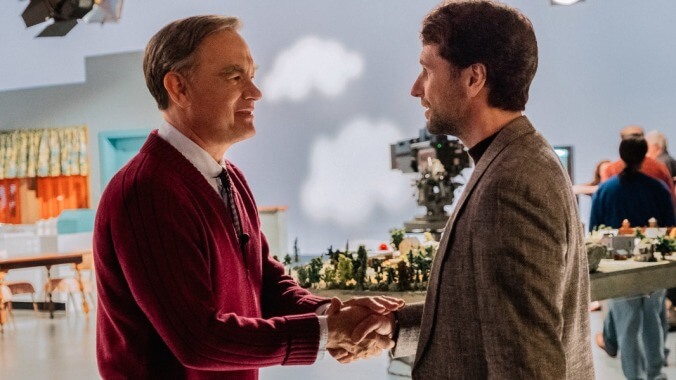Anyone who grew up on the gentle affirmations and plainly presented life lessons of Fred Rogers may feel a strange flush of cognitive dissonance during the first scene of A Beautiful Day In The Neighborhood (Grade: B-). The film begins with a mostly spot-on re-creation of the opening sequence of the beloved entertainer’s long-lasting educational television program, Mister Rogers’ Neighborhood: same cozy living-room set, same sequence of events (so long jacket; hello comforting cardigan!), and obviously the same cleanly enunciated theme song. But if I say mostly, it’s because that familiar routine and maddeningly cheerful tune—touchstones for multiple generations of one-time children—are performed this time not by Rogers but by a different icon of American wholesomeness, Tom Hanks. And while the actor offers the right mannerisms (like that little business where he throws one shoe into his hand) and at least attempts to get the purposefully stilted delivery down, this is not some uncanny impression. We know, every second, that we’re watching Tom Hanks play Mister Rogers. It’s distracting at best. For those with cherished memories of Rogers, it may be downright discombobulating.
Something happens, though, over the course of Marielle Heller’s sweet-natured film, which premiered a couple days ago here at the Toronto International Film Festival. More quickly than we might imagine, Hanks settles into the role, and maybe we in the audience—even the dyed-in-the-wool Rogers fans—may start to accept him in it. Hanks, of course, isn’t really a chameleon, Gump aside. He’s a classic movie star, possessed not of some vast range but of a certain appealing persona that filmmakers can use or tweak through context. Heller doesn’t even attempt to coax a truly convincing impersonation out of the actor; if she wanted that, she would have needed some Method shape-shifter, or maybe some unknown dead ringer for the friendly TV host. What the director does instead is harness Hanks’ essential decency and warmth and fatherly presence, and use it as a proxy for those qualities in Fred Rogers. She finds the spirit of Rogers in Hanks. It’s a bit like a mall Santa telling a kid wise to his act that, no, he’s not the real Santa Claus, but he’s been deputized by Santa personally, which kind of makes him the next best thing.
There’s been debate, inevitable to the fall festival circuit, as to what award-season category Sony may push for the performance. Because we’re talking here about Tom Hanks, America’s head of the household, a Best Actor campaign seems very much in the realm of possibility. But that would be blatant category fraud, no matter what the billing claims. In multiple senses of the word, Hanks is supporting in A Beautiful Day In The Neighborhood. Rather than build for Rogers a conventional highlight-reel biopic, the film essentially airlifts the late performer into a highly conventional, occasionally affecting drama about a cynical journalist (Matthew Rhys) sorting through his resentment for the father (Chris Cooper) who walked out on his family years earlier. The familiar setup, loosely based on actual Esquire writer Tom Junod’s experience interviewing Rogers for a profile, finds Rhys’ Lloyd Vogel dismissing the assignment as a puff piece, only to become touched by Rogers’ essential decency and openness—and more than that, increasingly pushed to reconcile with his bad dad.
There are hints of a thornier drama, or maybe a buddy movie of mismatched sensibilities, in the friction of the interview scenes, when Vogel’s probing investigative instincts bump up against Rogers’ sometimes exasperating positivity—a quality the film recognizes as its own potential form of evasion. (Anyone who’s ever had to fight to maintain control of an interview will nod with recognition at the cringe comedy.) But A Beautiful Day, for all its stranger touches (like using Neighborhood-style miniatures for the establishing shots, and inserting Rhys into a fantasy version of the show), is actually a pretty safe movie, pushing a rather boilerplate redemption-recovery story. The more interesting version of it would probably be less hagiographic, presenting Rogers as less of a guardian angel figure. There are times when the movie threatens to become a better version of Saving Mr. Banks, which also used Hanks’ aura of essential goodness as a stand-in for a weaver of childhood dreams.
The difference is that Rogers lives up to his legacy. He was, in his mission to get kids in touch with their emotions and their self-worth, about as close to a selfless force of good—a hero, as the dramatized version of Esquire categorizes him—as American television has produced. So maybe a little hagiography isn’t so bad in this case. A Beautiful Day In The Neighborhood works best when it keys into what made Rogers special: his genuine empathy, and his encouragement of people young and old not to feel ashamed of their feelings. It helps, of course, that an actor as good as Matthew Rhys, tapping into that winning mixture of steeliness and vulnerability he honed on The Americans, is the one absorbing Hanks’ secondhand sunshine. And that Heller, fresh off the sharp Can You Ever Forgive Me?, is the one mediating their communion, steering it away from schmaltz and into more honest and …Rogersian sentiment.


 Keep scrolling for more great stories from The A.V. Club.
Keep scrolling for more great stories from The A.V. Club.